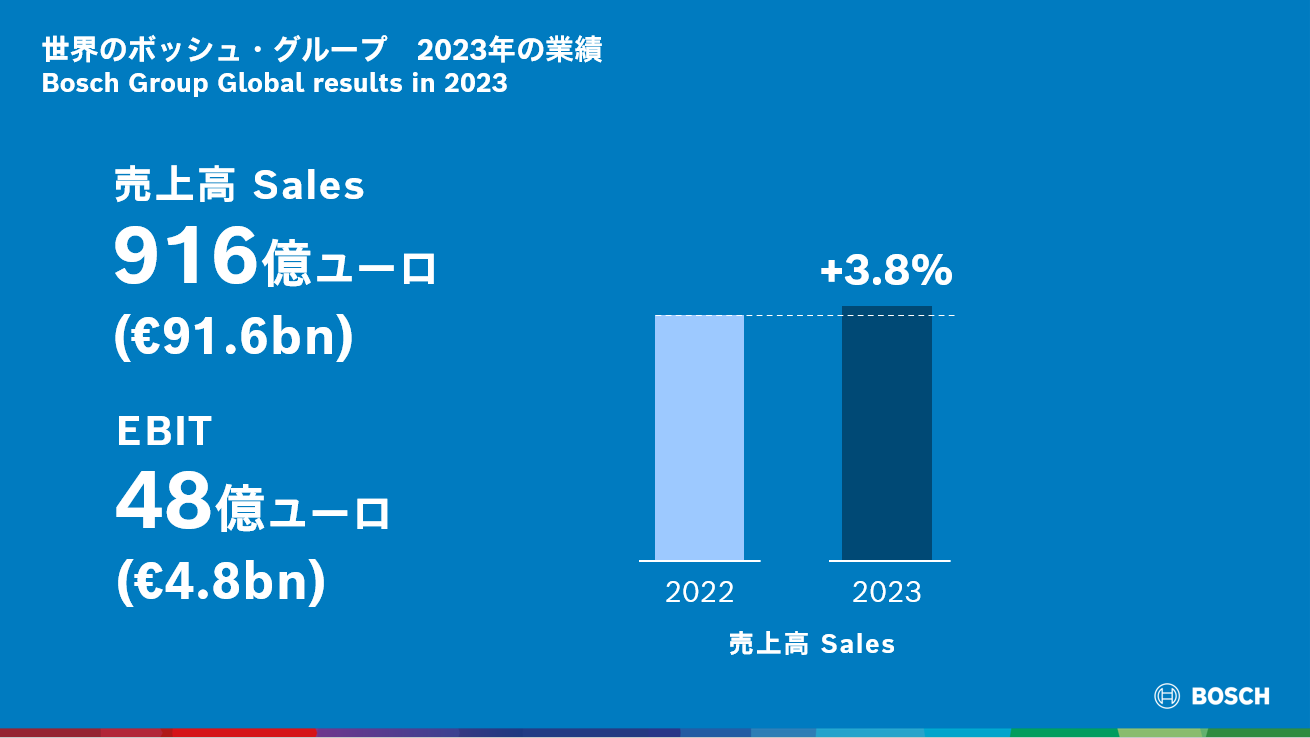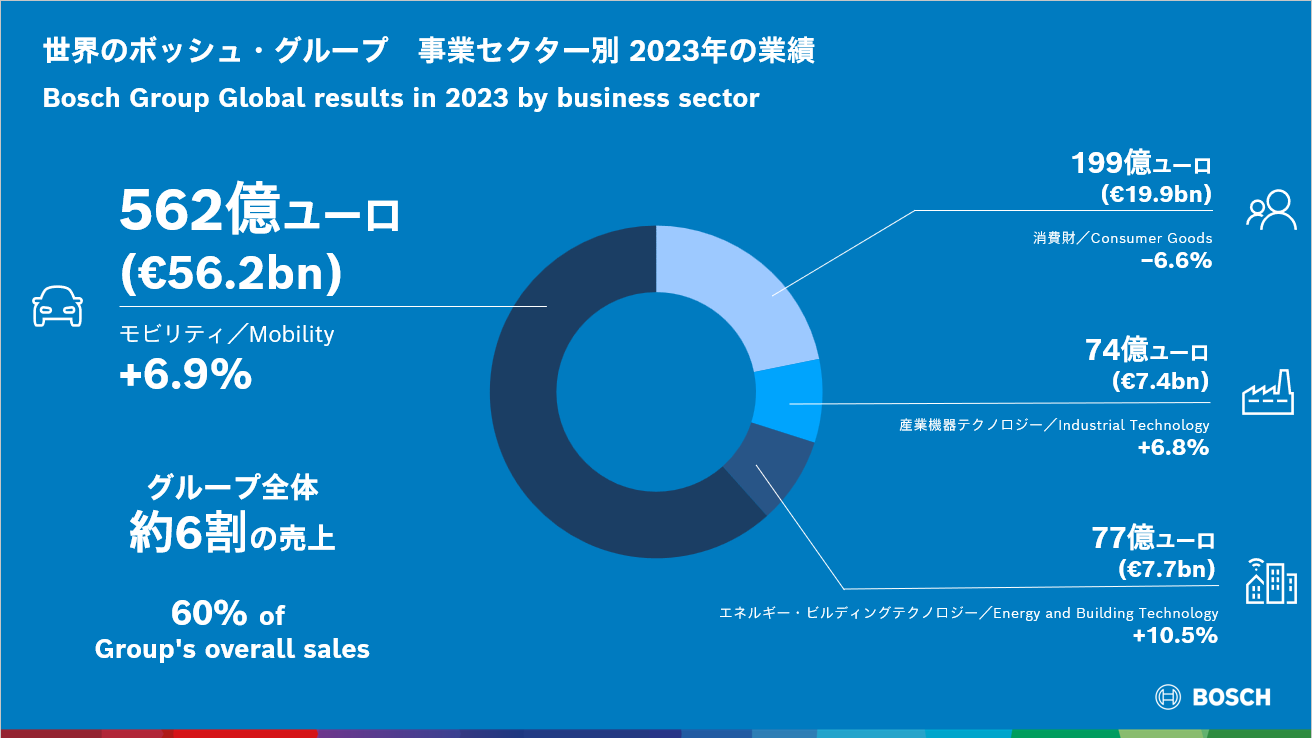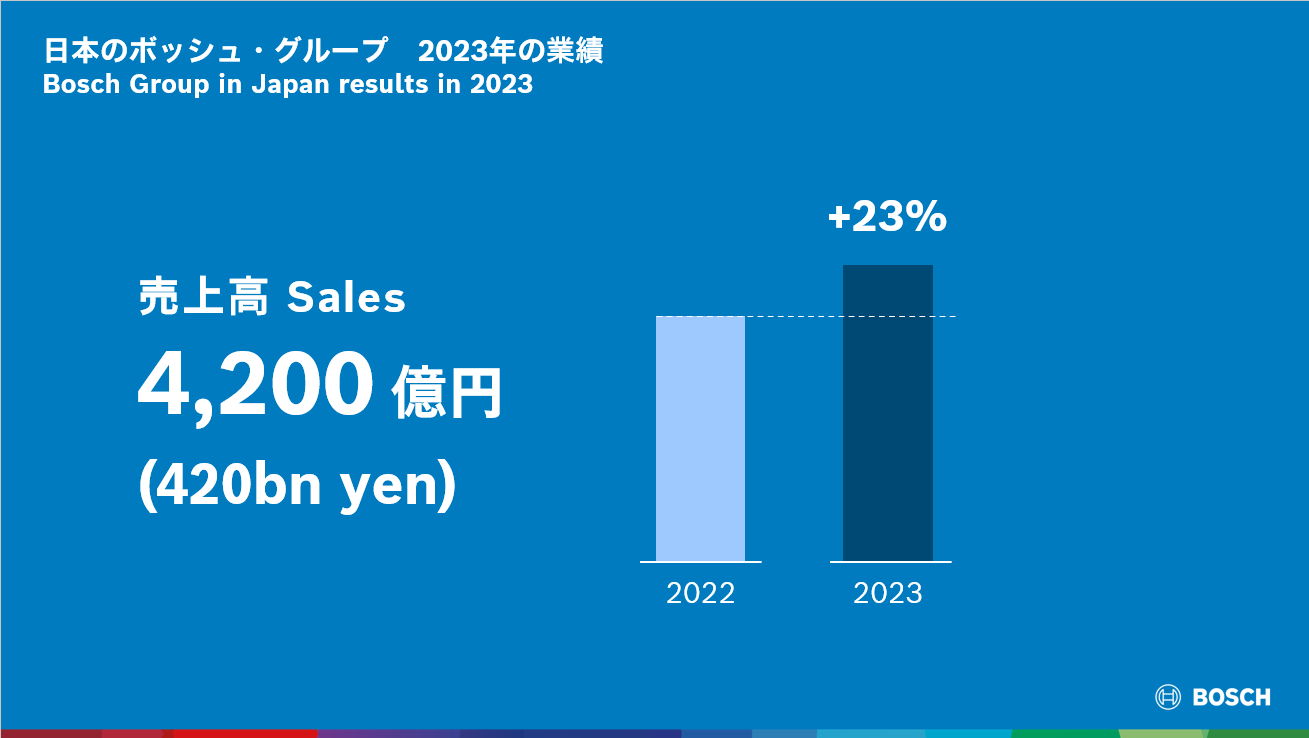Tokyo – Bosch, a leading global supplier of technology and services, ended its 2023 fiscal year with 420 billion yen (2.79 billion euros) in consolidated sales to third parties in Japan, up 23 percent in local currency compared to the previous year. The number of associates employed at Bosch in Japan stood at approximately 6,400 as of December 31, 2023.
In 2023, the number of vehicles produced in Japan showed a strong recovery from a three-year market decline caused by the COVID-19 pandemic and semiconductor shortage. As a result, vehicle production in Japan for 2023 reached nine million units, increasing 15 percent from the previous year. "Bosch increased its sales by 23 percent from the previous year and thus outperformed the growth of the Japanese automotive market by a considerable margin," said Klaus Meder, president and representative director of Bosch Corporation, Japan. "With the reorganization of the mobility business and the relocation of our Japanese corporate headquarters to Yokohama, we will promote collaboration within the organization and further strengthen Bosch's development structure in Japan. Bosch will continue to respond flexibly to customer needs and contribute to the development of the mobility market in Japan," Meder added.
The company expects a slight improvement of sales in 2024 compared to 2023, considering that economic growth in Japan is expected to be moderate and the year will still be full of challenges.
Comprehensive software solution for vehicle motion
In recent years, the mobility industry has been shifting to a software-driven vehicle development trend. In software-defined vehicles software increases the value of the vehicle by enabling users to update the onboard software, adding new functions to the vehicle and improving its performance even after purchasing the vehicle. In the field of vehicle motion, the driving functions required by drivers vary depending on the preferred driving behavior – from comfortable to sporty – and driving environment, such as city streets with many stop-and-go maneuvers, mountain roads with continuous curves, and highways. The software-defined vehicle enables the development of a variety of driving functions through stand-alone software which is independent from hardware, and users can select the functions they need. In addition, the performance of software functions can be enhanced through integrated control of multiple vehicle motion actuators. However, it is important to establish an ecosystem comprising software and services that enables successful joint development among automakers, suppliers, and third-party companies to implement these software functions. To achieve this, Bosch is developing vehicle motion management, a comprehensive software system solution for vehicle motion that allows integrated control of multiple actuators such as brakes, steering, powertrain, and suspension. It can collectively control multiple actuators required to operate each driving function, thereby increasing safety, comfort, and efficiency in all driving situations.
Hardware that expands the possibilities of software-defined vehicles
With vehicle motion management, all motion software functions can be decoupled from the hardware, allowing for flexible deployment of the software packages independent of the type or number of actuators controlled and without being tied to a specific E/E architecture. Alongside vehicle motion management, Bosch is also developing and launching new types of braking and steering systems. This year, Bosch began series production of the new brake unit, decoupled power brake, where pressure build-up and modulation is shared between decoupled power brake and ESP®. The decoupled power brake decouples the brake device from the pedal linkage. This offers a tunable and consistent pedal feel. Furthermore, Bosch is also developing by-wire braking and steering systems. In by-wire systems, the mechanical connection in the braking and steering system is replaced by electrical signals to transmit the driver's input. This also allows for additional benefits of motion features. In this way, Bosch is leveraging its strengths in both software and hardware domains to work on flexible solutions to meet the increasingly diverse needs of its customers.
Shaping the new era of mobility with a wide-ranging product portfolio
In the rapidly changing mobility market, automotive suppliers face an urgent need to change the organizational structure to respond quickly to customers' diverse needs. In 2024, Bosch completed construction of its new headquarters office in Tsuzuki Ward, Yokohama, and will relocate its headquarters from Shibuya, Tokyo. The new headquarters office will bring together approximately 2,000 associates of the Bosch Group currently stationed at divisions and the group companies scattered in the Tokyo-Yokohama area and will begin operations in the end of May, 2024. By consolidation, Bosch will promote collaboration among the divisions and the group companies, further strengthening its development structure in Japan. Moreover, the company reorganized its mobility business on a global scale, with Bosch Mobility being launched in January 2024. As part of the realignment, Bosch Mobility sector boards were established in each region, and Christian Mecker, executive vice president and a board member of Bosch Corporation was appointed president of the South and East Asia (Japan, South Korea, ASEAN, Oceania) sector board, with responsibility for overseeing strategy and technologies for the region. This will enable even faster and flexible decision making and allow rapid responses to the needs of customers in Japan.
Bosch already develops and manufactures the key components of modern vehicles under one roof, from brakes, steering, and electrical powertrains to sensors, vehicle computers, and software solutions. The company will respond to diversifying customer needs by strengthening its development structure in Japan and overseas and by developing comprehensive solutions. Bosch is also strengthening the collaboration with partners in all industries in order to provide customers with the latest solutions, and to realize solutions that go beyond the scope of an automotive systems supplier.
Bosch is pursuing the use of generative AI in terms to further improve automated driving functions. As part of this, Bosch and Microsoft are exploring opportunities to collaborate and leverage the power of generative AI. Today's driver assistance systems can detect people, animals, objects, and vehicles, but in the near future generative AI could help determine whether a situation could potentially lead to an accident. The expectation is that generative AI will enable vehicles to assess situations and react accordingly, and in this way keep road users even safer. As a technology company, Bosch is actively promoting the use of these advanced technologies.
Bosch Group: outlook for 2024 and strategic course
The Bosch Group increased its sales and earnings in 2023 and is successfully implementing its growth strategy despite a difficult environment. Stefan Hartung, chairman of the board of management of Robert Bosch GmbH, said: "In the 2023 business year, we achieved our financial targets and strengthened our market position in a number of business areas, from semiconductors to integrated building systems." The company increased its sales by 3.8 percent compared to the previous year to 91.6 billion euros despite unfavorable economic and market conditions. At 5.3 percent, the EBIT margin from operations was 1 percentage point higher than the previous year. It was therefore higher than expected, but still lower than the target margin of at least 7 percent required over the long term. Bosch wants to achieve this by 2026. In the first quarter of 2024, sales were down by more than 0.8 percent year on year; after adjusting for exchange-rate effects, this amounts to an increase of 2.7 percent. However, the company expects that it will be difficult to increase the EBIT margin from operations compared to the previous year. In addition to the subdued market environment and the expected further increase in upfront investments in areas of strategic importance, restructuring and process improvements will also have a negative impact at first, with their positive effect coming only after a delay. Even if the economic and social environment remains demanding, Bosch aims to rank among the top three suppliers in its key markets in all regions of the world. "We're pursuing innovations, partnerships, and acquisitions to ensure we grow as our industries transform – despite economic headwinds," Hartung said.
In its core mobility business, for example, Bosch is systematically driving forward strategic decisions for future growth. This year alone, it is launching some 30 production projects for electric vehicles. In the growth area of hydrogen, Bosch has reaffirmed its business expectations: by 2030, its sales with hydrogen technology could reach 5 billion euros. Bosch is also systematically exploiting growth opportunities in the area of heating technology. Although the heat-pump market stagnated across Europe in 2023, Bosch was able to grow its business by almost 50 percent. In the years ahead, Bosch will continue to grow significantly faster than the market in this segment. However, there could be a slight improvement in the consumer goods markets after two years of consumer restraint. Bosch expect its own business to stabilize, to which innovations as well as the expansion of its international footprint should contribute. Overall, climate action continues to play a central role for Bosch. In Hartung's view, it offers great opportunities for growth, even if markets such as electromobility are not developing as fast as expected. Nonetheless, Bosch is continuing to make heavy upfront investments in technologies for a carbon-neutral future, in order to help shape this transformation from the top. "There is pressure to cut subsidies for CO2-efficient technologies. But climate action requires sustained investment – from government, from companies, and from each and every one of us," Hartung said.
Contact for press inquiries:
Aiko Furuichi
Mariko Johdoji
email: sby_c_boschcorporationpr@bosch.com
Annual financial results 2023
Bosch achieves 23 percent sales increase over the previous year
2024/05/21



Bosch in Japan is currently represented in the country by Bosch Corporation, Bosch Rexroth Corporation and other affiliates. Bosch Corporation is responsible for the development, manufacturing, sales and services of automotive original equipment, automotive aftermarket products and power tools. Bosch Engineering K.K. provides engineering services, such as development and application for automotive systems. ETAS K.K. develops and provides engineering of development support tools of electrical control units. Bosch Rexroth Corporation develops and manufactures hydraulics, FA module components and other systems which contribute to industrial technologies. Bosch Security Systems Ltd. provides security and communication products and solutions to help secure the safety of lives, buildings and properties, and is also a supplier of professional sound systems. In 2023, Bosch Japan achieved sales to third parties of some 420 billion yen and employed approximately 6,400 associates.
Additional information is available online at
https://www.bosch.co.jp Bosch Japan Website (Japanese)
https://twitter.com/Boschjapan Bosch Japan X (Japanese)
https://www.facebook.com/bosch.co.jp Bosch Japan Facebook (Japanese and English)
https://www.youtube.com/boschjp Bosch Japan Youtube (Japanese)
The Bosch Group is a leading global supplier of technology and services. It employs roughly 429,000 associates worldwide (as of December 31, 2023). The company generated sales of 91.6 billion euros in 2023. Its operations are divided into four business sectors: Mobility, Industrial Technology, Consumer Goods, and Energy and Building Technology. With its business activities, the company aims to use technology to help shape universal trends such as automation, electrification, digitalization, connectivity, and an orientation to sustainability. In this context, Bosch's broad footprint across industries and regions strengthens its innovativeness and robustness. Bosch uses its proven expertise in sensor technology, software, and services to offer customers cross-domain solutions from a single source. It also applies its expertise in connectivity and artificial intelligence in order to develop and manufacture user-friendly, sustainable products. With technology that is "Invented for life," Bosch wants to help improve quality of life and conserve natural resources. The Bosch Group comprises Robert Bosch GmbH and its roughly 470 subsidiary and regional companies in over 60 countries. Including sales and service partners, Bosch's global manufacturing, engineering, and sales network covers nearly every country in the world. Bosch's innovative strength is key to the company's further development. At 136 locations across the globe, Bosch employs some 90,000 associates in research and development, of which nearly 48,000 are software engineers.
Additional information is available online at www.bosch.com, www.iot.bosch.com, www.bosch-press.com, and twitter.com/BoschPresse.
Note: one Euro = 151.9026 JPY (Calculated using the average rate in 2023)
Additional information is available online at
https://www.bosch.co.jp Bosch Japan Website (Japanese)
https://twitter.com/Boschjapan Bosch Japan X (Japanese)
https://www.facebook.com/bosch.co.jp Bosch Japan Facebook (Japanese and English)
https://www.youtube.com/boschjp Bosch Japan Youtube (Japanese)
The Bosch Group is a leading global supplier of technology and services. It employs roughly 429,000 associates worldwide (as of December 31, 2023). The company generated sales of 91.6 billion euros in 2023. Its operations are divided into four business sectors: Mobility, Industrial Technology, Consumer Goods, and Energy and Building Technology. With its business activities, the company aims to use technology to help shape universal trends such as automation, electrification, digitalization, connectivity, and an orientation to sustainability. In this context, Bosch's broad footprint across industries and regions strengthens its innovativeness and robustness. Bosch uses its proven expertise in sensor technology, software, and services to offer customers cross-domain solutions from a single source. It also applies its expertise in connectivity and artificial intelligence in order to develop and manufacture user-friendly, sustainable products. With technology that is "Invented for life," Bosch wants to help improve quality of life and conserve natural resources. The Bosch Group comprises Robert Bosch GmbH and its roughly 470 subsidiary and regional companies in over 60 countries. Including sales and service partners, Bosch's global manufacturing, engineering, and sales network covers nearly every country in the world. Bosch's innovative strength is key to the company's further development. At 136 locations across the globe, Bosch employs some 90,000 associates in research and development, of which nearly 48,000 are software engineers.
Additional information is available online at www.bosch.com, www.iot.bosch.com, www.bosch-press.com, and twitter.com/BoschPresse.
Note: one Euro = 151.9026 JPY (Calculated using the average rate in 2023)


